Contador's "Get out of ban free card."
 Wed, February 16, 2011
Wed, February 16, 2011 I am no fan of Floyd Landis but.... he has a right to be ticked off right now.
Last November Landis was interviewed on German television and said that the Union Cycliste Internationale (UCI) is corrupt and protects certain riders.
Now the UCI on February 7th sent Landis a letter giving him 15 days to retract his statement or be sued in a Swiss court. Floyd shot back an email that pretty much said, “I’m broke, so go ahead and sue good luck.”
What is the UCI thinking with the timing of this threat of a law suit? The handling of the Contador affair screams hypocrisy. Landis was found to have doped in the 2006 Tour de France, and was immediately stripped of his Tour win and barred from competition for two years.
Contador on the other hand was found to have Clenbuterol in his system within days of the Tour de France finish in July 2010, but the UCI kept it quiet until the end of September. Then they only said something because details had been leaked to the press.
Next the UCI pussy-foots around for months and finally handed the case over to the Spanish Cycling Federation, who initially gave Contador a one year ban. Alberto got off light when you consider most other athletes get two years.
Now in an unprecedented move a week later the Spanish Federation reverses its finding, and now says Contador is innocent. This came soon after the Spanish Prime Minister no less, stated that Contador had broken no Spanish law.
Floyd Landis broke no US law, but the American President or other top ranking US politician didn’t get involved in his case. The World Anti Doping Agency (WADA) has set a zero tolerance for clenbuterol in an athlete’s body, no matter how the substance got there. Its presence warrants a sanction; otherwise why have this rule.
Other athletes have already been sanctioned because of clenbuterol use; you can’t pick and choose who gets banned and who doesn’t. This is not criminal law of “Innocent until proven guilty” no one is being executed or sent to prison. These are rules of a sport that all the players agree to abide by.
The UCI has to step in now and ban Contador for the full two years and strip him of his TDF win. If they don’t they lose all credibility, and Floyd Landis is right; there is one rule for the super stars, and another for the rest.
The UCI needs to either strictly enforce its own rules on doping or get out of dope testing altogether and abide by whatever the WADA decides. The later might be the better choice because the UCI has a conflict of interest between promoting the sport of cycling, and enforcing the rules.
Right now they are failing miserably on both counts, and they are killing the sport they claim to love and uphold. If Contador rides in this year’s Tour de France I for one will not feel inclined to watch it.
 Comment,
Comment,  Drugs in Sport,
Drugs in Sport,  Opinion,
Opinion,  UCI
UCI 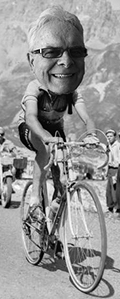









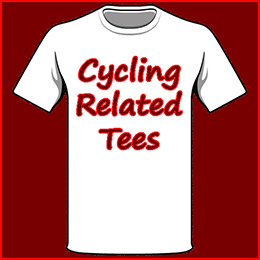











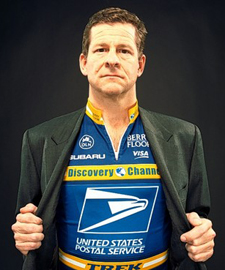


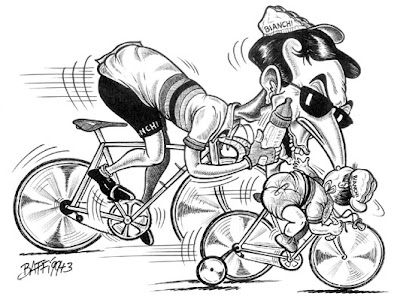
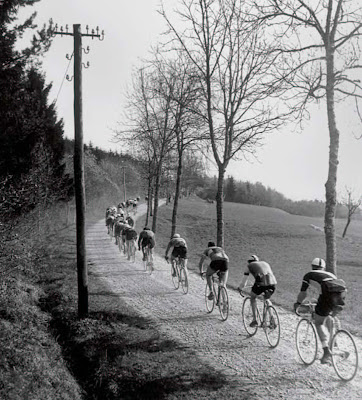

Nothing Changes
It was common knowledge that the top European professional cyclists competing in the Tour de France and the Giro d’Italia took dope.
Amphetamines to be precise. How did I know this? I was only 16 years old at the time.
It was not reported in the Cycling Press, there were no stories about doping in newspapers. It was obviously just passed on down from the top echelons of the sport by word of mouth.
It was never considered “Cheating.” After all if the entire TDF peloton was using dope, the playing field was level. These riders rode over the same mountain ranges they do today, when the roads were often no better than dirt tracks. Stages were often in excess of 250 kilometers, 156 miles, as a 16 year old I figured dope was necessary.
So if a 16 year old knew about it, then obviously the UCI knew of it, and also the cycling press. But none of them did an expose of the situation. Not until British cyclist Tom Simpson died on Mt. Vontoux during the 1967 Tour de France.
He died of heat exhaustion, but had pushed his body beyond its limits with the aid of amphetamines. The world's press was all over the story, and then the Cycling Press and the UCI acted in shock and horror, as if not knowing that this practice was going on right under their noses.
Doping in cycling has probably been in existence since the beginnings of the sport. Certainly since the start of professional cycling where there was money to be made, and promoters calling for faster and longer races. And if it was in cycling it was obviously there in other professional sports.
I am sure by now everyone in the cycling community has seen the Tyler Hamilton interview on 60 Minutes. If you haven’t seen it here is a short version. After watching it I feel like a fool, I really thought the sport was changing and they were at last getting a handle on the dope situation.
Now I find the only thing that has changed over the years is that is that drugs have become more sophisticated, and less easy to detect. And instead of being an open secret amongst the cycling community, as it was prior to the 1960s, it is now an open secret only among the professional cyclists themselves.
So here we are today 44 years after Tom Simpson’s death; the UCI still looks the other way, and wishes the whole doping thing (In particular the media talking about it.) would just go away. Should we really expect any different? The man at the top of the UCI is an ex-professional cyclist, am I to assume he never took dope during his career?
Tyler Hamilton’s claim that Lance Armstrong’s positive test in the 2001 Tour of Switzerland was “made to go away,” by the UCI, has a ring of truth to it. Because Alberto Contador’s clenbuteral positive was at first kept quiet by the UCI.
The UCI knew of it within days of the test in July 2010, but failed to make it public until September 2010, when the story was leaked by the testing lab. Had the story not been exposed, would Contador’s positive been made to go away also?
I still don’t see doping a cheating. It appears all top professionals are doing it so they compete on more or less equal terms. The only ones being cheated are the fans being led to believe the sport is clean.
However, doping is bad because young athletes see the pros do it and think it is okay to use that stuff, and it is not, especially using it unsupervised. There are some dangerous consequences.
The only way to stop drug use in professional sport is to make shame and the consequences of being caught not worth the risk of doing it.